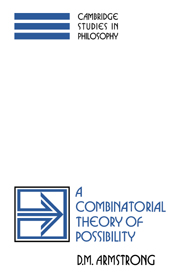Appendix: Tractarian Nominalism, by Brian Skyrms
Published online by Cambridge University Press: 05 June 2012
Summary
In the Tractatus Wittgenstein sketches a metaphysical position which displays nominalistic sympathies although it is certainly not nominalistic in either the terms of Ockham, or those of Quine and Goodman. In this note, I would like to explore a version of this position, and to say in what ways it is nominalistic and in what ways it is not. My aim is not, however, faithful exegesis of the Tractatus. The view which I call Tractarian Nominalism will have no part of Wittgenstein's interpretation of quantifiers, his fixeddomain treatment of possible worlds, or his quasi-intuitionist attitude towards infinity. Rather, I would like to give what I take to be the central idea of the Tractatus free play in less cramped quarters. The resulting metaphysics does, I believe, represent a viable ontological position. It has an advantage over traditional nominalism in the way in which it is connected to questions of epistemology. And it has an important consequence for the philosophy of logic. Tractarian Nominalism:
Wittgenstein's truly daring idea was that the ontology of the subject (nominalism) and the ontology of the predicate (platonism) were both equally wrong and one-sided; and that they should give way to the ontology of the assertion. We may conceive of the world not as a world of individuals or as a world of properties and relations, but as a world of facts – with individuals and relations being equally abstractions from the facts. John would be an abstraction from all facts-about-john; Red an abstraction from being-redfacts; etc.
- Type
- Chapter
- Information
- A Combinatorial Theory of Possibility , pp. 145 - 152Publisher: Cambridge University PressPrint publication year: 1989



